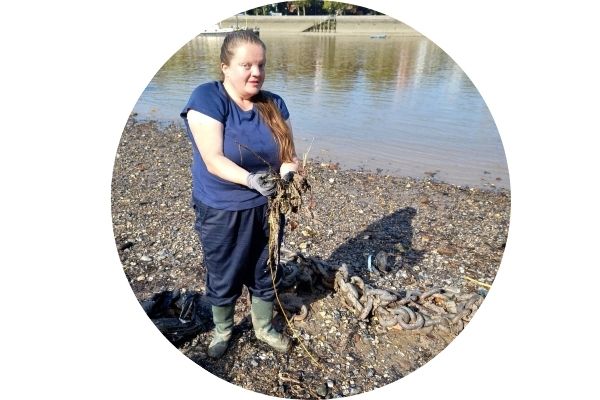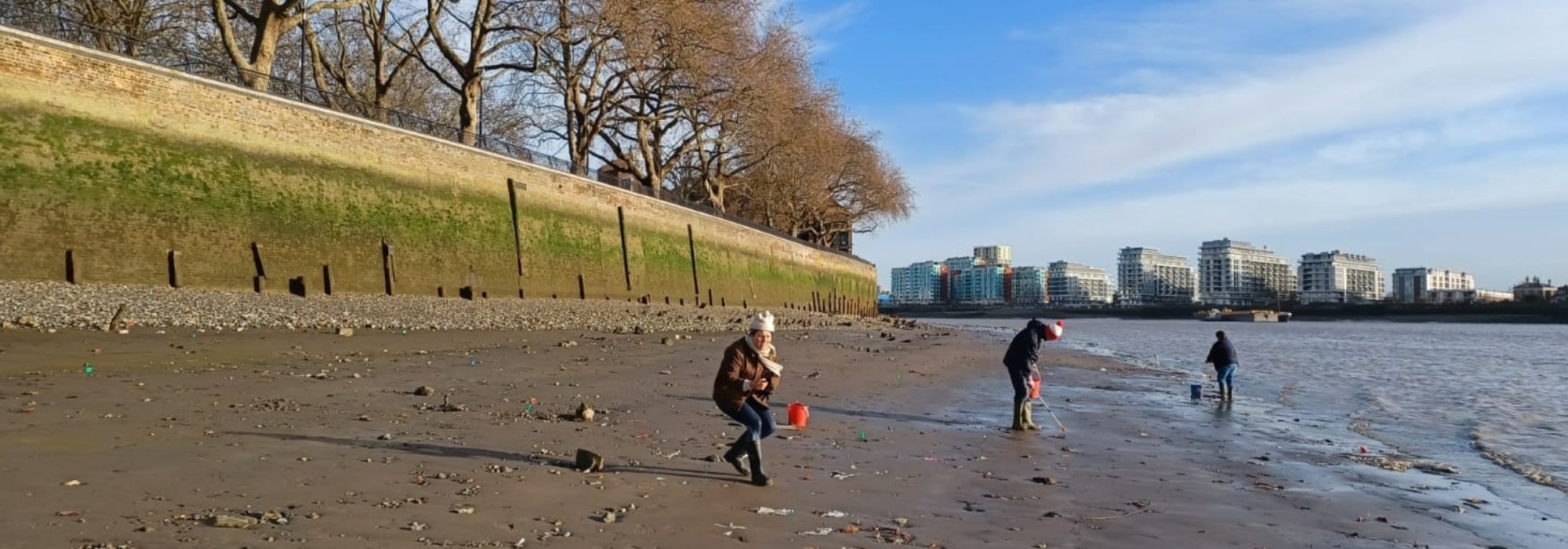Volunteer spotlight on Maarina Budd
 Messages in bottles may conjure up images of Robinson-Crusoe type figures, shipwrecked on remote islands or even trigger up memories of ‘that’ song produced by ‘The Police’. Yet, these unusual items are still being found on the Thames foreshore today. Thames21 volunteer Maarina Budd is no stranger of these finds, as she is also a mudlark – a treasure hunter who searches the foreshore mud for historical objects. Here, T21 communications manager Liz Gyekye caught up with Maarina to find out more.
Messages in bottles may conjure up images of Robinson-Crusoe type figures, shipwrecked on remote islands or even trigger up memories of ‘that’ song produced by ‘The Police’. Yet, these unusual items are still being found on the Thames foreshore today. Thames21 volunteer Maarina Budd is no stranger of these finds, as she is also a mudlark – a treasure hunter who searches the foreshore mud for historical objects. Here, T21 communications manager Liz Gyekye caught up with Maarina to find out more.
Tell me a bit about your background?
I was born and raised in Chelmsford, Essex, and moved to London just after the year 2000. I have worked in a range of roles, including working for the London Eye, Tower of London and Historic Royal Palaces. In 2018, I moved to Tunbridge Wells, Kent, where I currently live with my husband Mark and a black and white cat called Basil.
From my early childhood, I have always had a passion for the sea and our ever-changing coastlines. I am a third-generation fossil collector, but first and foremost I am a River Thames mudlark. I got my inspiration to take up mudlarking by watching various River Thames mudlark YouTube videos. This gave my ideas to become a mudlark, even though my busy working life sometimes got in the way. It wasn’t until the Covid 19 pandemic that I took the leap to become one. I was furloughed during this period and got so bored, I was literally climbing the walls. This prompted me to obtain my Thames Foreshore Permit from the PLA (legally you have to have this permit from the PLA to search the Thames foreshore). Subsequently, I got to check out the tides, work out my routes, get my wellies on and descended a set of stairs down which led to the Thames foreshore.
How was your first experience mudlarking?
The River Thames was a rubbish and detritus dumping ground for centuries. However, my first walk along the foreshore shocked me. Sure, I was finding and picking up the discarded little bits and pieces of china and pottery, bits of clay pipes and old pieces of glass, but I also found myself finding and picking up modern day rubbish as well and placing it in a carrier bag to be thrown away into the nearest bin that I could find.
You name it, I have found it. Plastic bottle caps, plastic bottles, and other little bits of plastic that once had a purpose but had found its way into the river. Sweet wrappers, crisp packets, polystyrene pieces, coffee cups and lids, plastic bags and sanitary towels/applicators the river had thrown up onto the foreshore. It’s almost like the river is trying to speak to us and say it wants to detox itself and get rid of the plastic pollution it.
I have always taken a spare bag with me whilst walking the coastline beachcombing or fossil hunting and always pick up what plastics and rubbish I can and remove it from harm’s way. It has become second nature to me now. Whenever I go mudlarking, I carry a bag with me and pick up plastics and litter as I walk along the Thames foreshore.
It’s not just plastic litter you have to watch out for, raw sewage is also a hazard, I have learnt.
I have a ‘ying and yang’ theory of the river – if I am kind to the Thames by removing plastics and litter from the foreshore and water, I will receive some beautiful finds back (some of which I use in crafting and making mosaics).
I recycle everything that I can at home. I even litter pick near my home in Kent and can be regularly seen popping the odd discarded pop can or bottle into the nearest recycling bin on my way to and from work.
Why do you volunteer for Thames21?
I found out about Thames21 from a fellow mudlark and YouTuber Nicola White (Tideline Art). After speaking to Nicola, I immediately signed up to take part in a citizen-science, litter survey event at Rotherhithe, London in September 2020.
Thames21 is an amazing charity that highlights the importance of the health of the river Thames and all its tributaries. I think it is also making the public more aware of the environmental issues with plastics and other pollution in our rivers. London’s great waterways and the mighty river Thames are there for us all to enjoy responsibly and the rivers are starting to teem with wildlife again after so many years of having little or no wildlife at all.
Rotherhithe was my first Thames21 volunteering opportunity. Here, I formed a bond with AJ (Thames River Watch Coordinator and organiser of the Big Wet Wipe Count) and Toni (Thames21 volunteer). As soon as that day was finished, I knew that I wanted to help out and lend a hand once more.
My next volunteering opportunity saw me take to the Thames foreshore at Battersea over two days last year in September at the Big Wet Wipe Count event. Here, I picked up a vast amount of wet wipes. On my mudlarking travels, this was not unusual. However, it was only until this event that I realised how big the problem was. It absolutely shocked me.
For me, volunteering over the two days was giving something back to the community. It always is with me. This is just as important as picking up the litter and plastics.
My next adventure with Thames21 was at Newcastle Dock, East London, for another litter survey. Here, I was happy to help Zara (Thames Monitoring Officer) and AJ set out survey lanes to monitor different areas of the Thames foreshore, even though it was cold and very windy that day. Still had fun though!
How long have you been volunteering for Thames21?
About two years now. I have taken part in four Thames21 volunteer days and I absolutely love taking part in them. It is a great way to make new friends, catch up with old friends, have a giggle, do something positive, help the environment and reconnect with the surroundings around you.
When you hear a volunteer say that looking at the world above you from the foreshore below your feet it is like being in another world, you connect with a sense of peace and quiet away from the hustle and bustle, the noise and the stresses from the world above and with that you find an inner harmony and a calling.
I reluctantly gave my space up on a recent Thames21 volunteer event again at Newcastle Dock as I had badly twisted my knee which also kept me off of the foreshore a number of weeks for Mudlarking. However, I am on the mend now and hope to be out on the foreshore again soon volunteering with Thames21 and back out mudlarking/litter picking on the glorious river Thames.
What solutions do you think your help will offer in the future?
Ugh, there are so many things that can help.
I think one of the answers would be for all of us to come up with solutions and new ways of thinking. It’s not just being accountable for our actions we must be responsible for them as well. Yes, there is change. Yet, there is so much more that every single person can do if they just gave a moment of their time to pick up that plastic bottle from the floor and put it in the bin (preferably a recycling bin). If my fellow mudlarks forget to bring bags out on the foreshore, they know I will have one and gladly take the plastics they find to put it in my bag.
I was on holiday in Lyme Regis, Dorset, when the first Covid restrictions eased last year. Whilst out on the beach at Charmouth, a little boy (he couldn’t have been more than 4 or 5 years old at the time) asked his dad “what the lady (referring to me) doing picking up plastic bottles?” His dad crouched down and explained to him that I was picking up plastic litter because it was harmful and hurt all the fish in the sea. His son said: “Can I pick up some bottles daddy?”
I went over to them and asked the dad if he needed a bag. The little boy looked up at his dad smiled and clapped his hands in excitement. I pulled a bag out of my pocket and left them to it. If that isn’t inspiring the future generations then I don’t know what is! My last memory of this little chap and his dad was of the little boy gleefully chucking a plastic food tray into the bag being held open by him dad and looking at the smile on the dad’s face…absolutely priceless.
By the way, what message did you find in that bottle?
In September 2020, when I signed up for Thames21’s Rotherhithe litter survey, my attention wandered when I was given the safety briefing. Looking down at my feet, I noticed a plastic whiskey bottle. My heart turned over as I realised it contained a piece of card with something in it. I showed the bottle to team and we all attempted to get the card out, but to no avail. I took the bottle home and managed to wrench out the card with pliers. I had no idea what I’d find, but was amused to discover a child’s drawing and the words ‘This is Stan, Mum ad Dad, Lockdown May 2020’. There was an email address and I decided to get in touch. Owen, Stan’s dad, was thrilled to hear I’d found the bottle, which they’d thrown into the water at Battersea, when the family were on a walk.
What’s your favourite way to help the planet (environmentally)?
Recycling whenever and wherever possible and being conscious of the world around me. Every individual can make the tiniest bit of difference.
Thames21 is, and always will be, a cause that is close to my heart.
Thanks Maarina.
Are you part a community that lives near the Thames? Would you like to get involved in a clean up project like Maarina? If yes, click on link below to find out more from our events page.
https://www.thames21.org.uk/events/
If you are a corporate group, please book with Thames21 using our corporate volunteering page.
